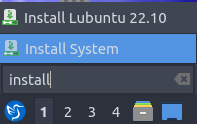Lubuntu 22.10 Released!
Thanks to all the hard work from our contributors, Lubuntu 22.10 has been released. With the codename Kinetic Kudu, Lubuntu 22.10 is the 23rd release of Lubuntu, the ninth release of Lubuntu with LXQt as the default desktop environment.
Support lifespan
With 22.10 being an interim release, it will follow the standard non-LTS support period of nine months, which means 22.10 will be supported until July 2023. Our development focus going forward will be on 23.04 and future releases, so only critical bugfixes and security updates will be provided. We STRONGLY recommend upgrading to 23.04 once it is released, before 22.10 hits end of life. If this is not suitable for you, but you still enjoy new features on a regular basis, we would recommend staying on 22.04 LTS with Lubuntu’s Backports enabled.
You can download 22.10 here. If you would like to upgrade your existing 22.04 LTS installation, please visit our manual page describing the process. Common Ubuntu instructions can be found here.
Known Issues and Notable Changes
LXQt
A bug in LXQt results in duplicate menu entries for the Calamares installer, showing the following:

While either of these options work, we recommend using the desktop icon.
System Installer and Potential Instability
Lubuntu uses the Calamares system installer in place of the Ubiquity installer that most other flavors use. While we are ensuring 22.04 LTS’ Calamares follows the upstream LTS cycle, we decided to get ahead of the curve by shipping Calamares 3.3 Alpha 2 in 22.10.
Here are the factors that went into this decision:
- Users will benefit from Calamares 3.3’s improved featureset and code cleanup.
- Calamares is now a community project. We are committed to supporting the development of Calamares, and are actively involved in submitting bugs and testing feedback upstream. This is partially for the benefit of the Calamares project as well.
- We now have an extremely thorough test suite covering a wide variety of install types. We have already tested for (and caught a few) bugs, and are confident this release will work for the vast majority of usecases extremely well.
- Our development Matrix(/Telegram/IRC) channel has a variety of skilled volunteers (that you can certainly join!) who will be happy to help if you find a Calamares bug.
Firefox, and the move to snap
An ongoing concern within the Ubuntu and Lubuntu communities has been the increased startup times for the Firefox web browser due to using the Snap package format instead of the traditional Debian-based package format used for the rest of the system. After careful consideration, taking into account the fast-paced technical improvements in modern web technology, the work required to keep Lubuntu users secure after the release, and Canonical’s commitment to Firefox as the default web browser for Ubuntu, we made the decision to keep this as-is.
That being said, the existing issues to watch out for include:
- On a fresh boot of a Lubuntu system, the snap needs to decompress into memory the first time you run it. This will result in the browser launching noticeably slower.
- Snaps ship with confinement enabled by default, in order to properly isolate the application from the rest of the system. While this eases the update process, if you need to pass through a device to Firefox (such as a smartcard), some manual work will be required.
We recommend consulting the Snapcraft Forums with any issues related to Snaps in general. More information on the Firefox snap specifically can be found here.
Artwork
The default wallpaper for 22.10 is from one of our Lubuntu Members, Aaron Rainbolt:

Our greeter background also received an update this time and is from another Lubuntu member, sudodus:

Both artists entered our artwork contest and were selected for this release. We appreciate the exceptional art submissions from the community.
Ubuntu Pro Advertisement
It has come to our attention that Ubuntu Pro integration in apt is a bit too aggressive. We understand (and agree with some of) the concerns; at this current point in time, apt does not silence that message when using -qq either. We also understand that, with Canonical being the corporate sponsor of Ubuntu, they are entitled to put product advertisement in Ubuntu. The most reasonable compromise in our opinion is to allow the user to turn it off if they so desire, and Canonical (as noted in the bug report) is working on a better long-term solution for this.
We appreciate your patience while a reasonable solution is being worked out. If this message is preventing you from being productive, a temporary workaround is available here.
DKMS issues and workaround
Dynamic Kernel Module Support (DKMS) is a core package which handles the (low-level) loading of kernel modules once installed. An example of this would be installing Broadcom drivers, for specific network adapters. The DKMS version shipped by default in 22.10 has a bug causing third-party kernel modules to not be properly built or signed on Secure Boot systems, breaking support for hardware that requires those drivers if Secure Boot is enabled. If you are planning on installing Lubuntu offline, note that you will need to manually download and update to the fixed version.
The easiest way to work around this issue on Lubuntu Kinetic is to simply run sudo apt update && sudo apt full-upgrade before attempting to install third-party drivers on your system. If that’s not an option, and if you have familiarity with the command line, you can find a workaround in this bug report. Thank you to Aaron Rainbolt, one of our project members, for assisting with this.
We agree this bug is far from ideal. Had this issue been addressed a day or two sooner, 22.10 users would likely not come across this in the first place. That being said, the Ubuntu Release Team and Ubuntu Stable Release Updates Team made the informed decision to accept this immediately following 22.10’s finalization. If they did make the decision to accept it earlier, that would require last-minute re-verification of all ISOs, delaying 22.10’s release until tomorrow or later.
Common Release Notes
Please also check the Ubuntu Release Notes for more common issues and bugs affecting all Ubuntu flavors.
What is Lubuntu?
Lubuntu is an official Ubuntu flavor which uses the Lightweight Qt Desktop Environment (LXQt). The project’s goal is to provide a lightweight yet functional Linux distribution based on a rock-solid Ubuntu base. Lubuntu provides a simple but modern and powerful graphical user interface, and comes with a wide variety of applications so you can browse, email, chat, play, and be productive. You can find the following major applications and toolkits installed by default in this release:
- LXQt 1.1.0
- Qt 5.15.6
- Mozilla Firefox as shipped in the snap package, at the time of release this is version 106.
- LibreOffice 7.4.2
- VLC 3.0.17
- Featherpad 1.3.0
- Discover Software Center 5.25.5
You can find a variety of other applications installed which aim to enhance your experience while staying out of the way of your normal workflow. New features and bugfixes in core Ubuntu components can be found here.
Lubuntu Manual
The Lubuntu Team has been hard at work in polishing the Lubuntu Manual to make it easy for new and experienced users alike to use their system more productively. The manual can be found at manual.lubuntu.me. We want to thank Lyn Perrine for all the hard work she has put into the Lubuntu Manual. Thank you!
Versions of the Lubuntu Manual:
While the documentation for previous releases will be kept in the Git repository, they will not be published anywhere.
Want an easy way to access the manual? Don’t worry, it’s now an (opt-out) desktop icon.
Lubuntu Project
How can I help?
We can always use more help! No matter your skill level or your technical experience, there’s something you can help with that can make a huge difference in Lubuntu. Join us on our chat (which is bridged three ways to Matrix, Telegram, and IRC) and talk to us there. Whether you know another language, have some spare time to help us test Lubuntu, are good at writing documentation, or just want to stay “in the know,” that is the place to be. More information about contributing can be found here. If you want to contribute to Lubuntu but do not feel you have the time or skills, consider buying a t-shirt or donating to Lubuntu. Another great method to get involved is bug reporting. If you notice an issue, please file a bug using the instructions on the Lubuntu Wiki. Don’t want to file a bug? Let us know what the problem is (in detail, enough that we can reproduce it) and we can assist you in filing one or do it ourselves.
Contributors
We would like to thank the following contributors for dedicating their time to Lubuntu this cycle. Thank you!
- Simon Quigley
- Walter Lapchynski
- Lyn Perrine
- Dan Simmons
- Chris Guiver
- Raman Sarda
- Thomas Ward
- Rober
- sudodus
- Leó Kolbeinsson
- KGIII
- Rik Mills
- Erich Eickmeyer
- Aaron Rainbolt
- Many more contributors!
In addition, we would also like to recognize some very active contributors on our Discourse forum.
We also wanted to give a special mention to Julien Lavergne, our Project Lead Emeritus and Founder. Without you, the Lubuntu project would not exist today. Thank you.
Global Team
The Lubuntu Global Team has been created to foster communities in non-English languages and locales. An up-to-date list of our communities can be found on our Links page, but the existing groups include: Spanish, Portuguese, Russian, Italian, Chinese, German, Japanese, Arabic, and French. If you would like to start a language group, join our development channel and talk with the Global Team. At minimum, you should have a few interested drivers of the community, and at least one administrator that speaks English. We now have multiple languages available in the support section of our Discourse forum.
